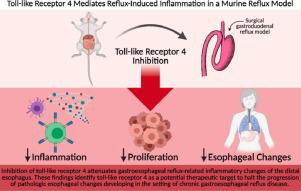Seminars in Thoracic and Cardiovascular Surgery ( IF 2.6 ) Pub Date : 2021-09-15 , DOI: 10.1053/j.semtcvs.2021.07.033 Anna K Gergen 1 , Michael J Jarrett 1 , Anqi Li 1 , Xianzhong Meng 1 , Akshay Pratap 2 , David A Fullerton 1 , Michael J Weyant 1

|
Dysregulation of toll-like receptor (TLR) signaling within the gastrointestinal epithelium has been associated with uncontrolled inflammation and tumorigenesis. We sought to evaluate the role of TLR4 in the development of gastroesophageal reflux-mediated inflammation and mucosal changes of the distal esophagus. Verified human esophageal Barrett's cells with high grade dysplasia (CPB) and esophageal adenocarcinoma cells (OE33) were treated with deoxycholic acid for 24 hours. Cells were pretreated with a TLR4-specific inhibitor peptide 2 hours prior to deoxycholic acid treatment. Inflammatory markers were evaluated using immunoblotting and enzyme-linked immunosorbent assay. A surgical reflux mouse model was generated by performing a side-to-side anastomosis between the second portion of the duodenum and the gastroesophageal junction. Control animals underwent laparotomy with incision and closure of the esophagus superior to the gastroesophageal junction (sham procedure). Esophageal sections were evaluated using hematoxylin and eosin staining and immunohistochemistry. Deoxycholic acid increased expression of inflammatory markers including intercellular adhesion molecule-1, vascular cell adhesion molecule-1, and interleukin 8. Pretreatment with a TLR4 inhibitor significantly decreased deoxycholic acid-induced inflammatory marker expression. C3H/HeNCrl mice demonstrated a significant increase in mucosal hyperplasia and proliferation following DGEA compared to sham procedure. TLR4 mutant mice (C3H/HeJ) undergoing DGEA demonstrated an attenuated hyperplastic and proliferative response compared to C3H/HeNCrl mice. Inhibition of TLR4 signaling attenuates reflux-induced inflammation in vivo. These findings identify TLR4 inhibition as a potential therapeutic target to halt the progression of pathologic esophageal changes developing in the setting of chronic gastroesophageal reflux disease.
中文翻译:

Toll 样受体 4 在小鼠反流模型中介导反流诱导的炎症
胃肠道上皮细胞内 toll 样受体 (TLR) 信号通路的失调与不受控制的炎症和肿瘤发生有关。我们试图评估 TLR4在胃食管反流介导的炎症和远端食管粘膜变化的发展中的作用。已验证的人类食管 Barrett 细胞高度异型增生 (CPB) 和食管腺癌细胞 (OE33) 用脱氧胆酸处理 24 小时。在脱氧胆酸处理前 2 小时,用 TLR4 特异性抑制肽预处理细胞。炎症标志物使用免疫印迹和酶联免疫吸附试验。通过在十二指肠的第二部分和胃食管交界处进行侧对侧吻合来生成手术反流小鼠模型。对照动物接受剖腹手术,在胃食管连接处上方切开和闭合食管(假手术)。使用苏木精和伊红染色以及免疫组织化学评估食管切片。脱氧胆酸增加炎症标志物的表达,包括细胞间粘附分子-1、血管细胞粘附分子-1 和白细胞介素 8. 用 TLR4 抑制剂预处理可显着降低脱氧胆酸诱导的炎症标志物表达。与假手术相比, C3H/HeNCrl 小鼠在 DGEA 后表现出粘膜增生和增殖的显着增加。与 C3H/HeNCrl 小鼠相比,接受 DGEA 的 TLR4 突变小鼠 (C3H/HeJ) 表现出减弱的增生和增殖反应。抑制 TLR4 信号可减轻体内反流诱导的炎症。这些发现将 TLR4 抑制确定为潜在的治疗靶点,以阻止在慢性胃食管反流病的情况下发生的病理性食管变化的进展。











































 京公网安备 11010802027423号
京公网安备 11010802027423号